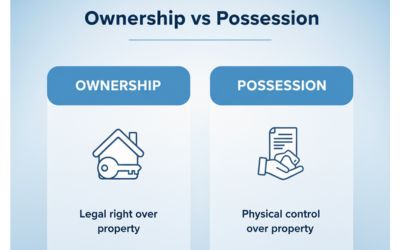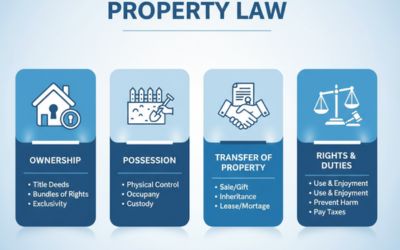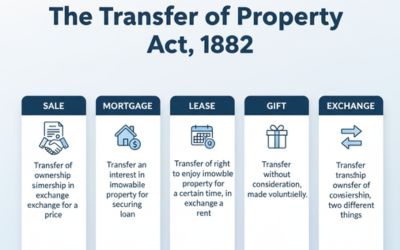Shanti Devi v. Amal Kumar (AIR 1981 SC 1550)

Quick Summary
The plaintiff leased a cinema hall for a fixed term with options to renew. Later, she sued for ejectment. The key question was: Is a notice under Section 106 of the Transfer of Property Act (TPA) needed? The Supreme Court said no—because this lease ended by efflux of time under Section 111(a) TPA. When a fixed term ends, the tenancy is over by law. A Section 106 notice is not required.
Issues
- Is a suit for ejectment maintainable without a Section 106 TPA notice when the lease has a fixed term?
Rules
- Section 111(a) TPA—Efflux of Time: A lease for a definite term ends automatically when the term expires.
- Section 106 TPA—Notice: If the lease has already ended by time under Section 111(a), a quit notice under Section 106 is not necessary.
Facts (Timeline)
19 Mar 1956 Lease Created
Plaintiff leased “Shanti House” cinema at Sainthia to the defendant for four years with two renewal options of three years each. Start date linked to licensing.
1960s–1970 Term Lapses
The fixed-term arrangement ran its course. The plaintiff treated the tenancy as ended by time.
3 Apr 1970 Alternative Notice
Plaintiff also sent a quit notice (alternative plea) to Calcutta and Sainthia addresses, determining the tenancy at end of April 1970.
2 May 1970 Suit Filed
Plaintiff filed ejectment suit saying the lease had expired by efflux of time; notice pleaded in the alternative.
Trial & Appeal Mixed Views
Trial court and District Judge decreed ejectment (accepting quit notice). High Court reversed, holding notice not proved; suit not maintainable.
Supreme Court Final Decision
SC allowed the appeal: when a fixed-term lease expires by time (s.111(a)), s.106 notice isn’t needed.

Arguments
Appellant (Shanti Devi)
- Lease was for a definite term; it ended by time—no Section 106 notice needed.
- Even otherwise, a quit notice was sent as an alternative step.
- Courts should look first at Section 111(a), not only at service of notice.
Respondent (Amal Kumar)
- Suit not maintainable without a valid Section 106 notice.
- Disputed service and validity of the alleged quit notice.
- Supported the High Court’s approach on notice requirement.
Judgment
The Supreme Court allowed the appeal and set aside the High Court’s judgment. It held that the lease was for a fixed term and had expired by efflux of time under Section 111(a) TPA. Therefore, a Section 106 notice was not necessary to maintain the ejectment suit. On the respondent’s request, the Court granted time to vacate till 31 December 1981, subject to filing an undertaking within four weeks and not parting with possession meanwhile.

Ratio
- When a fixed-term lease ends by efflux of time (s.111(a) TPA), tenancy ends automatically.
- In such cases, a Section 106 TPA notice is not a condition for filing an ejectment suit.
- Courts should address the legal mode of termination before debating notice service.
Why It Matters
Landlords and students often mix up Section 106 and Section 111(a). This case draws a clean line: for fixed-term leases, expiry by time ends the tenancy—no extra notice is required. It saves needless disputes over service of quit notices.
Key Takeaways
- Fixed-term lease → ends by time → no Section 106 notice needed.
- Check the clause on term and renewals first.
- Courts prioritise statutory mode of termination over proof of notice.
- Time to vacate may be granted with strict undertakings.
Mnemonic + 3-Step Hook
Mnemonic: “TIME > NOTICE”
- TIME: If the fixed term ends, the lease ends.
- NOTICE: Section 106 is not needed after Section 111(a) kicks in.
3-Step Hook: Read the term → Check expiry → File ejectment (no s.106 needed).
IRAC Outline
Issue
Is a Section 106 TPA notice mandatory for ejectment when a fixed-term lease has expired?
Rule
- Section 111(a) TPA: lease ends by efflux of time.
- Section 106 TPA: notice not needed if the lease has already ended by time.
Application
The cinema lease had a definite term. The tenancy ended when the term expired, so the suit was maintainable without proving a Section 106 notice.
Conclusion
Appeal allowed; High Court reversed; trial decree restored. Limited time to vacate granted on undertaking.
Glossary
- Efflux of Time
- Automatic end of a fixed-term lease when the set period finishes (TPA s.111(a)).
- Quit Notice
- Notice under Section 106 TPA to end certain tenancies; not needed if lease already ended by time.
- Undertaking
- A promise to court to vacate by a date and not part with possession till then.
FAQs
Related Cases
Efflux of Time Cases
Decisions clarifying Section 111(a) TPA and automatic termination.
Section 106 Notice Cases
When quit notice is essential in periodic tenancies.
Share
Related Post
Tags
Archive
Popular & Recent Post













































































































Comment
Nothing for now